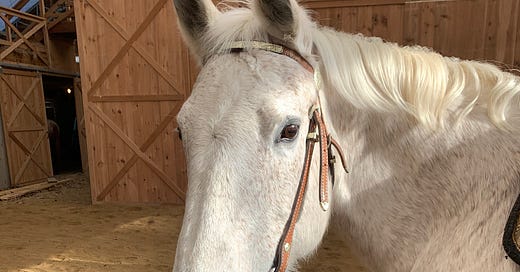
Hitting the like button is a great way to support this project. <3
“I think that loss is affecting them in a way that they don’t really know because they haven’t experienced it…it’s a loss of, a little bit a loss of identity, I think. And when you have that loss, where are you going to get it back?”
— An interview participant1 describing the impacts of the declining caribou population on young Inuit men in the Nunatsiavut region in Labrador, Canada
In his paper on ecological grief as a crisis in dwelling, philosopher Pablo Fernandez Velasco reflects on the response from an interview participant who was asked about the impacts of the declining caribou population in the Nunatsiavut region in Labrador Canada.
He notices the interview participant’s use of the word where in their question: “when you have that loss, where are you going to get it back?” As they consider the restoration of identity, the participant does not wonder when or how it might happen, but where.
For Velasco their use of the word where affirms the relationship between identity and place, a connection that’s not always well understood or even recognized. The participant’s account of losing identity due to the loss of caribou and related place-bound practices reflects the ways “our sense of identity is worked out in relation to place and our active engagement with it.”
I’ve thought a lot these last years about the ways grief over interpersonal losses can expose the degree to which identity is relational. As Judith Butler has written, “I think I have lost ‘you’ only to discover that ‘I’ have gone missing as well2.”
And for Velasco, grief over ecological losses may similarly reveal the ways identity is placed. Place in this context can be conceived of as a structure within which identity unfolds. It makes sense then, that disruptions to place—fires, floods, explosions—would involve corresponding disruptions to one’s sense of self.
I’ve been thinking about Gaston Bachelard’s Poetics of Space this past week, amidst so many accounts of homes and other significant places that have been lost in the Los Angeles fires. My first encounter with Poetics of Space was thanks to Temenos Center for the Arts’ Rabbi Zach Fredman, who shared this passage from it in his newsletter some time ago, and then again this past week:
“…if I were asked to name the chief benefit of the house, I should say: the house shelters daydreaming, the house protects the dreamer, the house allows one to dream in peace….Without it, man would be a dispersed being. It maintains him through the storms of the heavens and through those of life. It is body and soul. It is the human being’s first world.”
I love this description of houses and I love Bachelard and I know that a house and a home are not the same thing, but a few months ago I read this transcript of a conversation between writers Dionne Brand and Adania Shibli. And in it, Brand said that home must be something with “a moving description,” one that might adequately attend to “its fracturedness, and how even fascists can call something home.”
For Brand, the meaning of home should stay always “open and disturbed in some kind of way, qualified.” So I was excited to read Velasco’s paper, which looks closely at the notion of dwelling; a related concept that describes a “commonplace occurrence…an ordinary way of engaging one’s surroundings and finding them significant.3”



